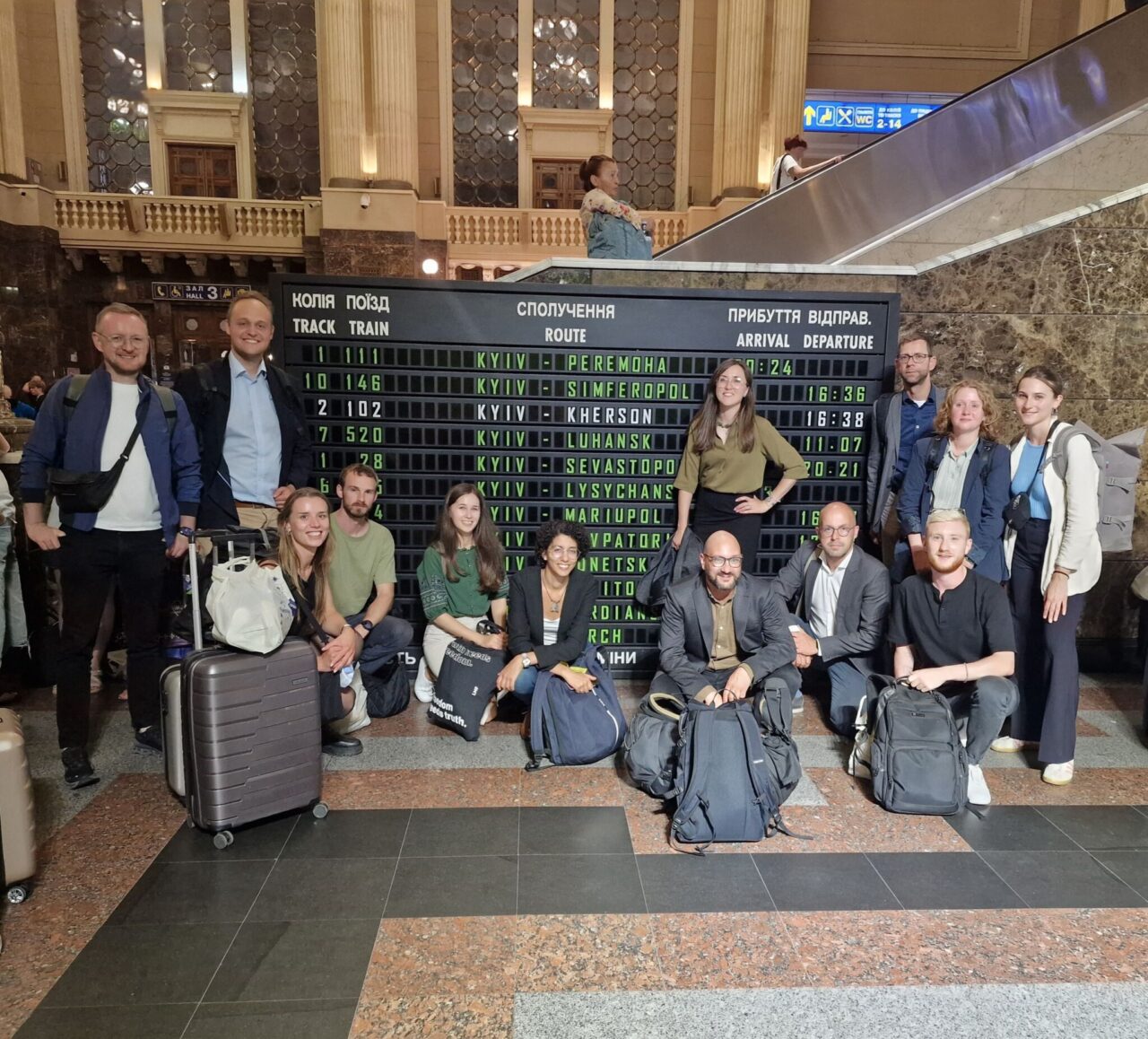
Germany is one of the key partners of Ukraine in countering russian aggression. Military and political support, as well as efforts to improve European unity, are integral to our common struggle for security and freedom.
Thus, such events as the visit of the Bundestag delegation to Kyiv are of particular significance. They allow our German colleagues to witness the war’s consequences, hear from Ukrainian parliament members, experts, and civil society, and enhance our collaboration toward victory and recovery.
The German delegation included representatives of parliamentary committees, deputative teams, and experts in the field of security and international policy. We organized their visit in cooperation with the Zentrum Liberale Moderne (Berlin) within the “Ukraine on the road to the EU” project (former “Ukraine in Europe: Parliamentary Dimension” program).
Upon arrival, the German partners visited Kyiv districts affected by the latest russian shelling. They also met with the Soloma Cats CSO, which ensures aid to affected communities and records the consequences of the attacks. This part of the visit was of symbolic importance: the delegates saw the daily reality that the Ukrainians live in.
Then there was a “Democracy in Wartime”, in which People’s Deputies of Ukraine Hryhoriy Nemyria, Ivanna Klympush-Tsintsadze, and Halyna Yanchenko participated.
It was focused on the challenges faced by democratic institutions in wartime, the risks of excessive concentration of power, the need to maintain transparency and political competition, and the importance of international support.
“Is comprehensive democracy possible during wartime? No. Is Ukraine a comprehensive democracy today? No, because of the war. The only way to restore it is to end the war,” emphasized People’s Deputy Halyna Yanchenko.
Other important topics were security and the international strategy to end the war. Lesia Ogryzko, Mykhailo Samus, Mykola Bielieskov, Oleksandr Khara, and Maksym Chebotariov, Ukrainian analysts and defense experts, took part in the discussion. Together with representatives of the Bundestag, they discussed the Western countries’ lack of a clear strategy for ending the war, the fear of russia’s defeat, and a gradual approach to aid to Ukraine.
“Europe should not merely support Ukraine. We should improve defense capabilities together to contain russia. Otherwise, European countries will also be attacked,” noted Mykhailo Samus.
Ralf Fücks, co-founder of the Zentrum Liberale Moderne, emphasized:
“Non-recognition of territorial annexations, respect for Ukraine’s sovereignty and its right to choose alliances, integration into the European community, and efficient security guarantees. These are minimal goals, but even they require a huge effort from Europe to ensure a strong military status of Ukraine against russia.”
In the following days, the delegation held a series of meetings with high-ranking officials and members of parliament. When discussing the future peace, Pavlo Klimkin, a former Foreign Minister, noted that a compromise is possible, but not concessions. This means no restrictions for the Ukrainian military, the development of the defense industry, support for logistics and intelligence, and also non-recognition of the occupied territories.
Yehor Cherniev and Solomiia Bobrovska, representatives of the Verkhovna Rada Committee on National Security, Defense and Intelligence, took part in the discussion about the situation on the frontline and the role of international partners in our defense capability development. In particular, the members of parliament noted the crucial need for anti-aircraft systems, long-range missiles, and ammunition. Yehor Cherniev stressed,
“We have drones, but not enough people. Russia suffers more losses, but also has more human resources. Moreover, the russians can copy drone technology in a month.”
When meeting with the Ukrainian military, the delegates learned about the current situation on the frontline, key threats, and the army’s needs. Major General Valentyn Holovnov, Colonel Oleh Rybalko, representatives of the Territorial Defense Forces command, and political scientist and military officer Taras Berezovets also took part in the discussion. They explained to their German colleagues how the Ukrainian party sees the situation.
Special attention was paid to energy security. The delegation met with representatives of the parliamentary Energy Committee, in particular, with Inna Sovsun. They discussed the russian attacks affecting the energy system, cyber threats, and the role of decentralized generation in resilience development.
The Ukrainian party emphasized that despite the massive attacks, they managed to maintain an uninterrupted electricity supply. Still, it was necessary to prepare for possible attacks on the energy system in the fall.
A special part of the program was a meeting with Andriy Pasternak, head of the Joint Center for Coordination of the Search and Release of Prisoners of War and Persons Illegally Deprived of Liberty as a Result of Russian Aggression. The delegates learned about Ukraine’s efforts to return its citizens from captivity.
They also met with Maksym Butkevych and Yelyzaveta Sokurenko, human rights defenders from the Human Rights Centre ZMINA. The participants discussed the problems former prisoners of war and civilians face after their release from russian captivity. They specifically emphasized the importance of documenting war crimes and ensuring justice for victims.
“This war is not waged for a territory. Russia seeks to destroy Ukraine as a community of people having the right to decide their future. That is why we call it a genocidal war,” noted Maksym Butkevych, co-founder of the Human Rights Centre ZMINA and a former prisoner of war.
The finale of the visit was a meeting with Robert Preße, the Deputy Defense Attaché of the Federal Republic of Germany in Ukraine, when they discussed further coordination of security cooperation.
The visit of the German delegation was an important signal of solidarity and support. It proved that German parliamentarians were ready to further defend Ukraine’s interests in European institutions and jointly seek answers to the challenges the entire democratic world faced due to the war.
We are grateful to our partners and are always happy to see them in Ukraine!
The “Ukraine on the road to the EU” project (former “Ukraine in Europe: Parliamentary Dimension” program) is implemented by East Europe Foundation in cooperation with the Zentrum Liberale Moderne (Berlin) with the financial support of the German Federal Foreign Office.